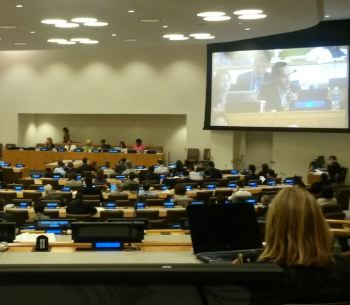|

Image: Revista Puerto / FIS
Protected marine areas can be created in international waters
 (ARGENTINA, 3/21/2023)
(ARGENTINA, 3/21/2023)
It will be from the entry into force of the first International Treaty for the Protection of the Altamar and the biodiversity of areas outside the national jurisdictions achieved by the UN. It is great news for Argentina that sees in area 41 FAO how fleets of distant countries predate transzonal natural resources without any regulation.

Source: Protected planet
The Ocean Treaty began to be discussed in 2006 and after almost two decades of negotiations, on March 5, the member countries of the United Nations Organization achieved the approval of a text “which seeks to guarantee conservation and Sustainable use of marine biological diversity of areas outside the national jurisdiction,” they reported from the UN.
The legal framework, known as "high seas treaty", would place 30 percent of the world's oceans in protected areas, would allocate more money to marine conservation and cover access and use of marine genetic resources. "It is a victory for multilateralism and for global efforts to counteract the destructive trends facing the health of the oceans, now and for the generations to come," said the UN Secretary General, António Guterres.
.png) Image: FAO / Wiki / FIS --> Image: FAO / Wiki / FIS -->
The approved text has four main points: the creation of protected marine areas (AMP) in international waters; the distribution of the benefits of marine genetic resources; Environmental impact evaluations and the development of capacities and transfer of marine technology to developing countries.
The point is of great importance for Argentina, since it proposes to create an AMP world network that covers 30 percent of the global ocean by 2030, and must be representative of the main ecosystems and be connected. These amp could protect from the indnr fishing to transzonal resources in the South Atlantic.
The impact that this agreement will have, especially on Argentina, once it is formally approved, could be very positive. "We would be in a position to control the fleets of rich countries that are removing all the resources that are straddling," Maximiliano Bello, an expert in international ocean policies and one of the main promoters of marine protected areas in Latin America, assured the newspaper La Nación. , special guest of the Our Oceans Conference.
 “Everything that is happening outside 200 miles will impact directly on the ecosystem, on the economy and about the people who live on those resources. The same goes for other rich countries that continue to make these resources through the subsidies that allow them, for example, to renew the ships. And we don't have that capacity. We do not have it in Chile, we do not have it in Argentina, we do not have it in Peru, we do not have it in Ecuador ... So, others come and take what they decide that it is theirs,” added Maximo Bello. “Everything that is happening outside 200 miles will impact directly on the ecosystem, on the economy and about the people who live on those resources. The same goes for other rich countries that continue to make these resources through the subsidies that allow them, for example, to renew the ships. And we don't have that capacity. We do not have it in Chile, we do not have it in Argentina, we do not have it in Peru, we do not have it in Ecuador ... So, others come and take what they decide that it is theirs,” added Maximo Bello.
The UN Secretary thanked the critical support in achieving the high seas treaty of non -governmental organizations, civil society, academic institutions and the scientific community. Some points were more discussed than others, the technological strengthening of developing countries did not present problems, but the evaluations that will measure the impact of other activities on the environment and the creation of AMP were more discussed, although none as much as related to the Regulation of marine genetic material.
The distribution of genetic information and its benefits among all countries has been a point that has put the signing of the text at risk. The property of this information and the patenting of the findings has been so far in the hands of those who have the means to find them, a situation in which developing countries are very disadvantaged.

IUU fishing. Source: Revista Puerto
But from now on, "they should be distributed among all," said Máximo Bello and confirmed that "the distribution of the future benefits of species that can offer patentable genes, for example, for use in medicine." In fact, some means indicate that the distribution mechanisms that will be implemented remain to be defined.
Perfectible, not enough ambitious for part of the scientific community, but one step forward regarding what you had. That was what the delegates transmitted to the president of the conference, Rena Lee, when he cheered it when he said: "Ladies and gentlemen, the ship came to the coast" to announce the signing of the agreement.
By Karina Fernández | Revista Puerto
.jpg)
Related News:

[email protected]
www.seafood.media
Information of the company:
|
Address:
|
International territory in Manhattan
|
|
City:
|
New York
|
|
State/ZIP:
|
(10017)
|
|
Country:
|
United Nations
|
|
Phone:
|
212 906 5000
|
|
Fax:
|
212 906 5001
|
|
E-Mail:
|
[email protected]
|
More about: 
|
|
|
|



